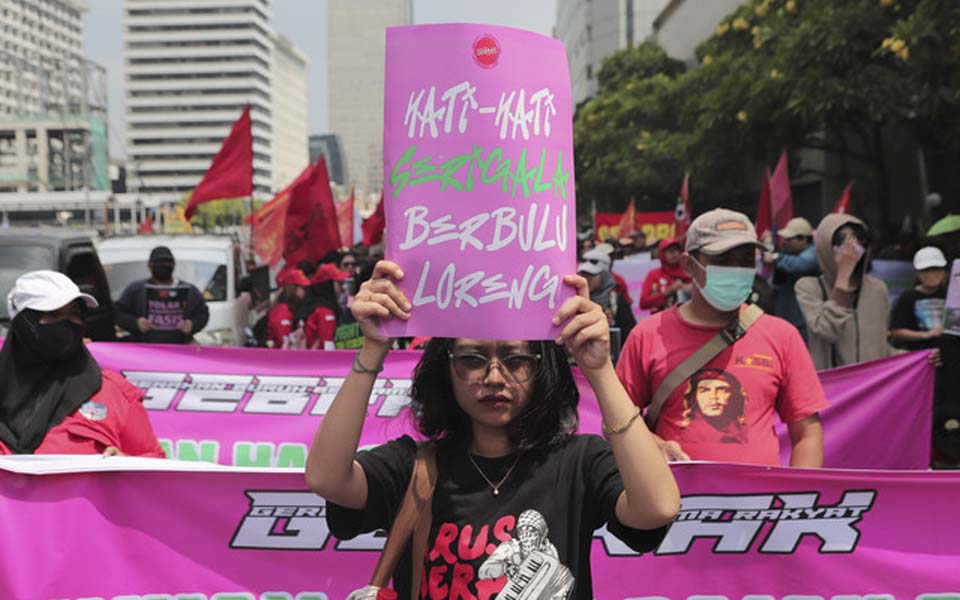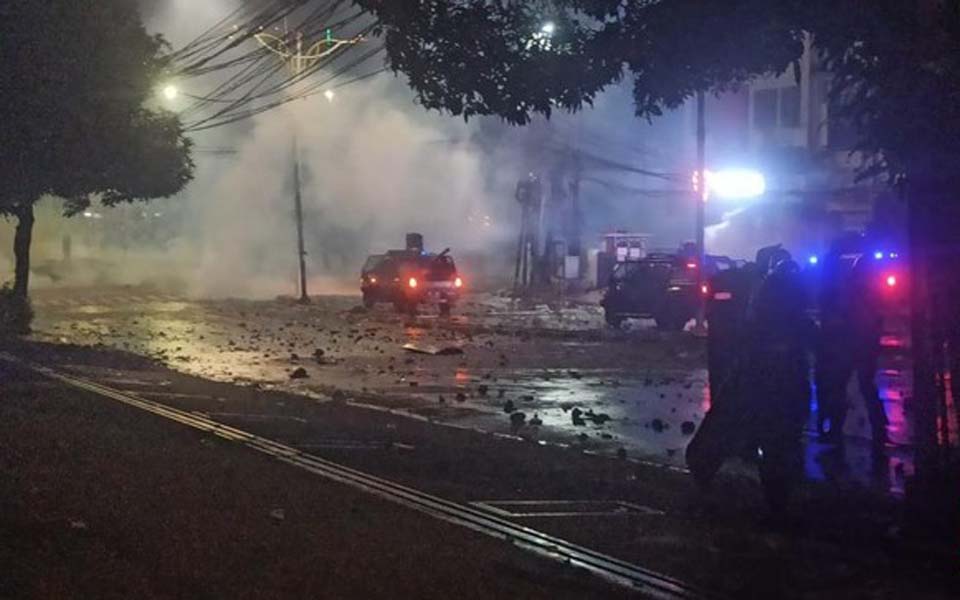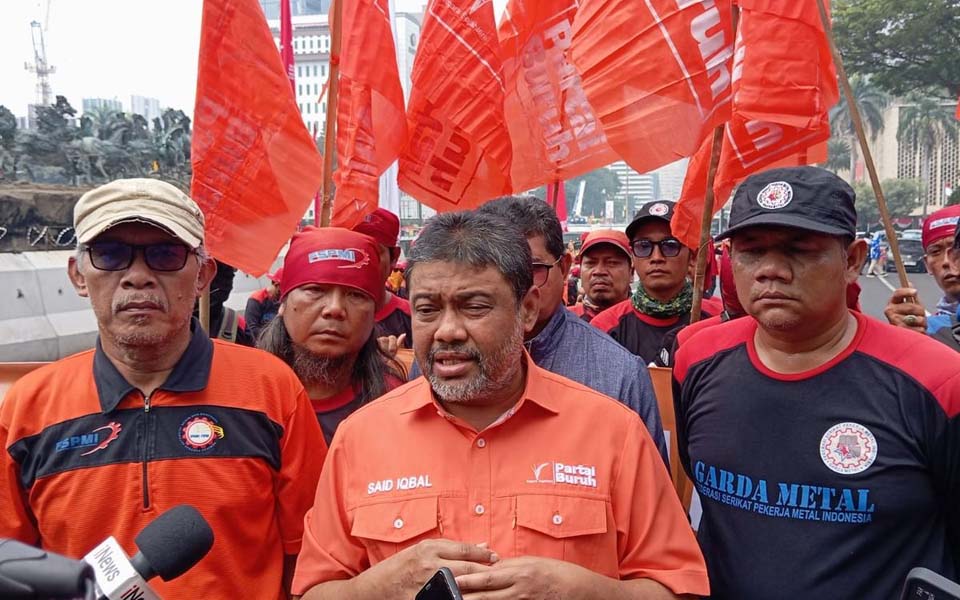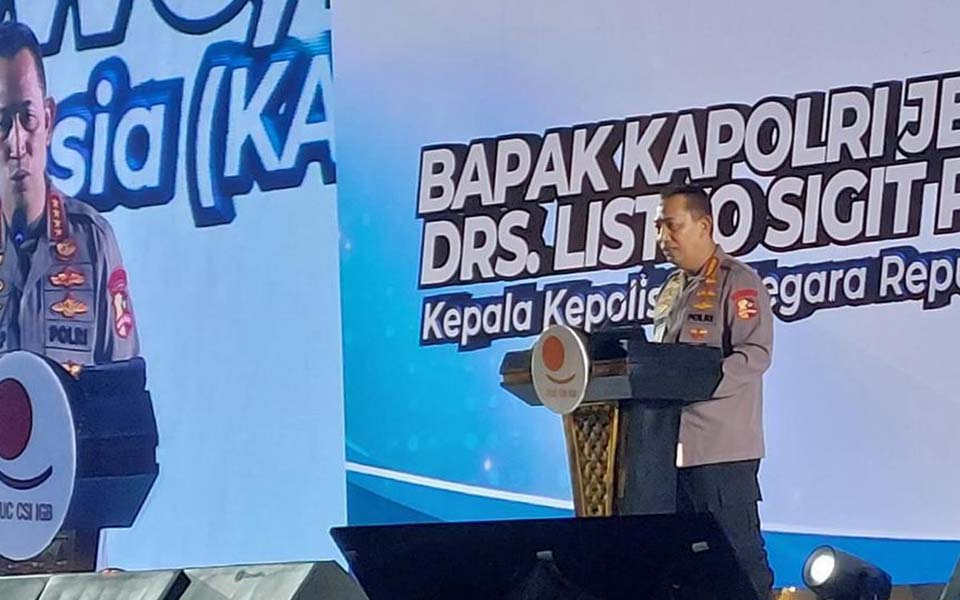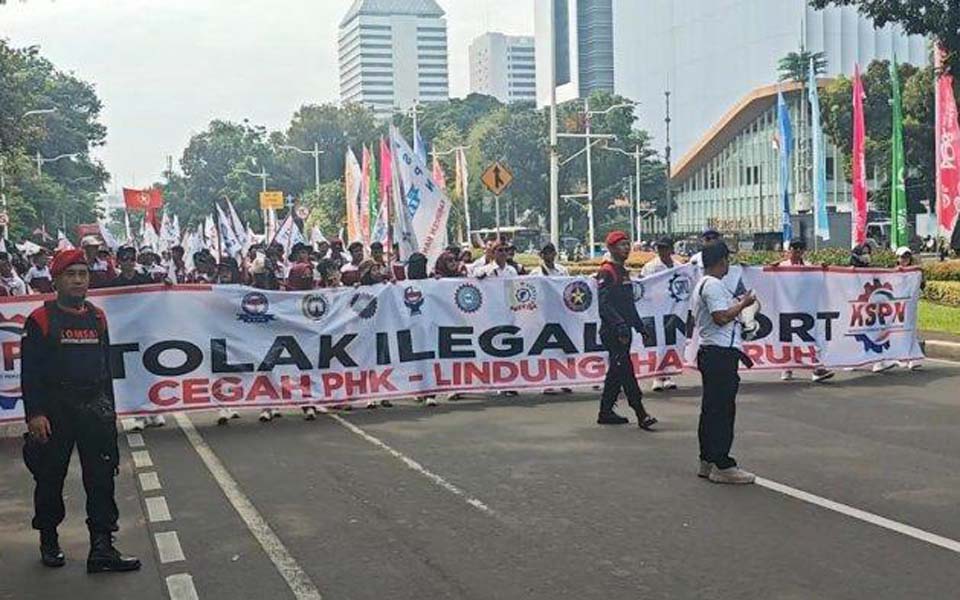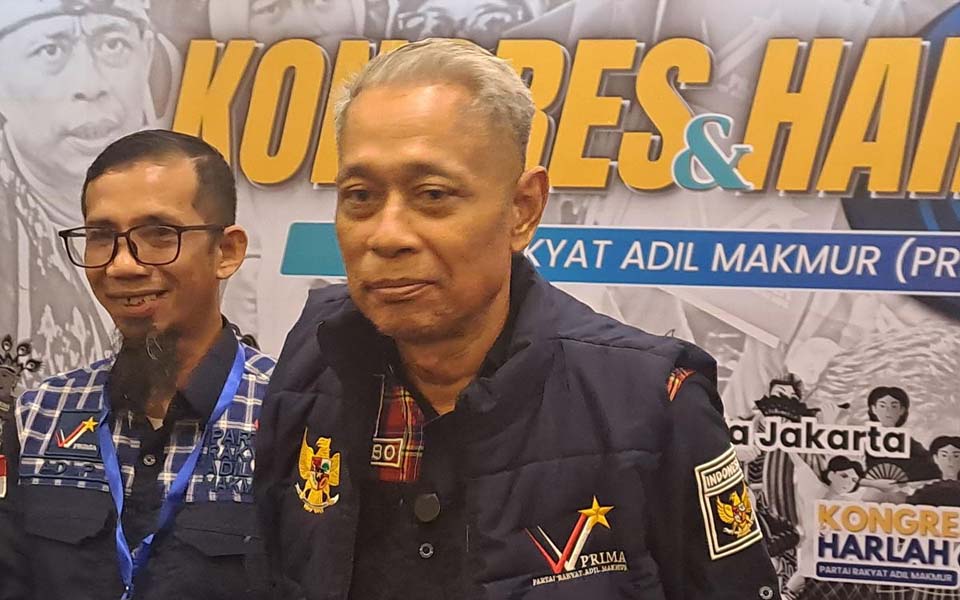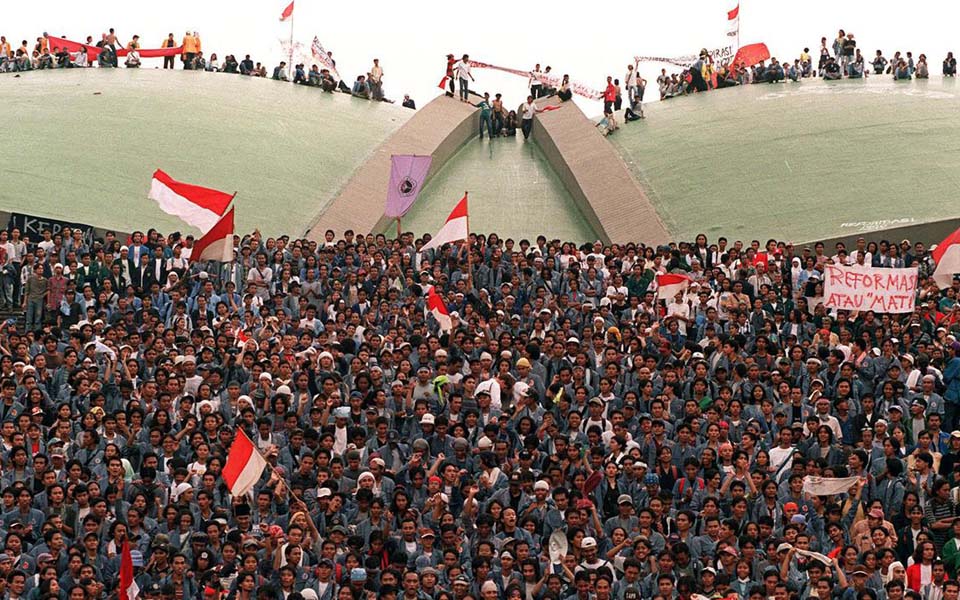Dipo Negoro – The Labour Party (Partai Buruh) organised a three day national working meeting (Rakernas) on January 14-17. The meeting was attended by some 800 Labour Party executive committee representatives from 38 provinces.
According to Labour Party President Said Iqbal (who is also the President of the Confederation of Indonesian Trade Unions, KSPI), as quoted by koranperdjoeangan.com, the Rakernas recommended supporting four prospective presidential candidates in the 2024 elections. They were Central Java Governor Ganjar Pranowo (supported by 15 provinces) and former Jakarta Governor Anies Baswedan (six provinces) along with alternative candidates Said Iqbal (14 provinces) and liberal TV presenter Najwa Shihab (three provinces).
For vice presidential candidate, the names proposed were Indonesian Chamber of Commerce and Industry (Kadin) Chairperson Arsjad Rasjid (supported by 21 Provinces), Coordinating Minister for Security, Politics and Legal Affairs Mahfud MD (three provinces), Said Iqbal (seven provinces), Najwa Shihab (three provinces), Indonesian Farmers Union (SPI) Chairperson Hendri Saragih (two provinces) and East Java Governor Khofifah Indar Parawansa (one province).
Ahead of International Labour Day (May Day) on Monday May 1, the Labour Party elite, specifically Iqbal and Confederation of the All-Indonesian Workers Union (KSPSI) Chairperson Andi Gani Nena Wea, launched a maneuver. This began with Iqbal congratulating Pranowo for his nomination as a presidential candidate by the ruling Indonesian Democratic Party of Struggle (PDI-P).
"The Labour Party, which exists in 38 provinces, 457 regencies and cities, and 4,626 sub-districts, and has more than 10 million cadres and sympathisers from workers, fisherpeople, women workers, migrant workers, teachers and honorary teaching staff, health workers, informal workers, generation Z and millennials, whose fathers and mothers are working class, as well as other ordinary people, expresses its congratulations on the selection of Ganjar Pranowo as a candidate for President of the Republic of Indonesia in 2024", said Iqbal.
The Labour Party also invited Pranowo, Baswedan and Shihab to attend a May Day Fiesta event at the Senayan Sports Stadium in South Jakarta following the May Day street rallies. But not one of them turned up. Iqbal first said that Pranowo could not attend because he was summoned to a meeting with the PDI-P, while Baswedan did not respond to the invitation. Iqbal later clarified that the Baswedan's invitation had not been sent. On Monday evening Iqbal and Andi Gani met with Pranowo at the Central Java representative office in Jakarta. There, Andi Gani emphasised that the KSPSI and its 10 federated unions would go all out to support Pranowo's campaign to become president. Pranowo meanwhile claimed that workers do not in fact oppose the Omnibus Law on Job Creation, but only the cluster of labour related articles in the law. Iqbal meanwhile took the opportunity to kiss Pranowo's hand in a traditional gesture of respect.
The failure of Pranowo and Baswedan to attend the May Day Fiesta organised by the Labour Party is perhaps a reflection of the infighting between the trade union bureaucratic elite within the Labour Party itself. Andi Gani has long been close to the PDI-P and supported President Joko "Jokowi" Widodo's election campaigns in 2014 and 2019. In May 2015 he was given the post of president commissioner and concurrently the independent commissioner of the state-owned construction firm PT PP with a monthly wage in 2016 of 57.6 million rupiah and transport allowance of 11.52 million rupiah.
Iqbal meanwhile is close to Defense Minister and Greater Indonesia Movement Party (Gerindra) Chairperson Prabowo Subianto and the Islamic based Justice and Prosperity Party (PKS). The KSPI, the Indonesian Metal Trade Workers Federation (FSPMI) and the National Trade Union (SPN) supported the Prabowo backed ticket of Baswedan and business tycoon Sandiaga Uno in the divisive and religiously charged 2017 Jakarta gubernatorial elections.
During the massive demonstrations in 2016 against then Jakarta Governor Basuki "Ahok" Tjahaja Purnama – an ethnic Chinese-Christian accused of insulting Islam – organised by the reactionary National Movement to Safeguard the Indonesian Ulema Council's Fatwa (GNPF-MUI), the KSPI and the FSPMI used the name the Indonesian Workers Movement (GPI) in order to take part in the demonstrations. Purnama was subsequently charged and imprisoned for blasphemy and lost the election to Baswedan. On another occasion, Iqbal declared that the KSPI would hold a national strike to coincide with the second Defend Islam commemoration rally in Jakarta by the GNPF-MUI.
One good development however is the open criticism against the trade union elite that has begun to be made by the Labour Party's National Political Committee (Kompolnas) camp and the Confederation of United Indonesian Workers (KPBI). Kompolnas Secretary General Rivaldi Haryo was quoted in parade.id as saying he regretted the meeting between Pranowo, Iqbal and Andi Gani. He also said that the meeting was not officially sanctioned and without the knowledge of other elements within the party. Haryo added that the meeting was unhealthy because of claims that the Labour Party would direct its support to Pranowo. In addition to this, the claim that the Labour Party does not oppose the Omnibus Law but only the cluster or labour related articles is in conflict with its official position.
Haryo also noted that the Labour Party's official position, which came out of the last national coordinating meeting, totally conflicts with what was said by Iqbal and Andi Gani.
First, the Labour Party rejects the Omnibus Law in its entirety, not just the cluster of labour related articles. Second, because of this it rejects presidential and vice presidential candidates (capres-cawapres) from or backed by political parties that supported the Jobs Law. Third, the Labour Party supports an alternative candidate, meaning one that is relatively free from the influence of the oligarchy and the parties that supported the Omnibus Law. Fourth, supporting alternative candidates requires revisions to the existing electoral laws, in this case the 4 percent parliamentary threshold required to gain a seat in the House of Representatives (DPR) and the 20 percent presidential threshold required to field a presidential candidate. Because of this, the Labour Party plans to submit a judicial review of these regulations with the Constitutional Court. Fifth, there is still the official position taken prior at the last Labour Party convention that Pranowo and Baswedan are not good presidential candidates for workers or ordinary working people (farmers, the urban poor and so on).
Haryo also stated, "So far, we from the Labour Party's National Political Committee have refrained from conveying our aspirations regarding a capres-cawapres to the public because we respect the Labour Party's internal mechanisms, namely the next Labour Party convention that will be organised in June or July 2023".
In order to overcome the current problem Haryo called on "... all Labour Party Central Executive Committee leaders to immediately determine the stages of the Labour Party convention to nominate a presidential candidate in the form of a decree. We also call on all Labour Party members to have the courage to convey their positions and views on the matter of a capres-cawapres. The determination of the Labour Party's capres-cawapres is extremely important for the future of the Labour Party and ordinary working people more broadly".
But restraint and being conscious of the Labour Party's internal mechanisms is not the correct approach to deal with the current situation. We still recall how the trade union bureaucratic elite used the internal mechanisms and their position in the trade unions in maneuvers designed to weaken the labour movement in 2012. Internal mechanisms and bureaucratic maneuvers are the playing field of these bureaucratic elites.
Sharp and open criticism of the trade union bureaucratic elite in order to win mass support for the Labour Party must be continued and intensified. But this will not be enough to weaken such maneuvers and the grip of the Labour Party elite. As we have previously noted, one of the main problems at the moment is the labour movement's lack of radicalisation. The labour movement and the people's movements in general have actually continued to decline since the trade union bureaucratic elite destroyed the labour movement in 2012. Even the upsurge in the movement during the Reform Corrupted (Reformasi Dikorupsi) mass demonstrations and the huge anti-Omnibus Law protests in 2019 were unable to win the demands of workers and the ordinary people.
The decline in the movements has also resulted in workers' consciousness being further hegemonised by the political elite. It must also be understood that the results of the Labour Party Rakernas, where the majority supported Ganjar Pranowo, Anies Baswedan or Arsjad Rasjid, shows that although it can be said to be democratic, the Labour Party is dominated by the trade union bureaucratic elite and depends upon the majority of the masses whose political consciousness is in fact far from the slogan, "We are the working class". One thing that is clear is that these presidential candidates are in fact all in part of the political elite that are the mortal enemies of workers and the ordinary people. Included within this is the PDI-P, the National Mandate Party (PAN), the United Development Party (PPP), the Golkar Party, the National Awakening Party (PKB), the National Democrats (Nasdem) and Gerindra, as well as the so-called parliamentary opposition parties – the Democrat Party and the PKS. Post reformasi (the political reform process that began in 1998) they have all been in power or part of the opposition. And during this entire time there has been no significant improvement in the lives of workers and the ordinary people.
What is needed right now is increasing the radicalisation of workers and the ordinary people. The National Political Committee, the KPBI, the National Labour Movement Centre and others must take advantage of Said Iqbal's call to launch a national strike calling for the Job Creation Law to be revoked. On May 4 Iqbal said that they would launch "A national strike of 5 million workers at 100 thousand factories. This will stop production, leave the factories because we are being harmed". Iqbal's statement must be used to call out the KSPSI, the Indonesian Confederation of Prosperity Labour Unions (KSBSI), the KSPI, the FSPMI and all elements of the Labour Party to consolidate and launch preparatory actions for the national strike. This consolidation must primarily be done on a mass basis in each organisation. Preparing strike committees in every factory and industrial zone, on every campus and in the regions.
Unity and joint consolidation must be built with other groups, especially the Labour Movement with the People (GEBRAK), one of the main groups that along with the Indonesian Trade Union Congress Alliance Confederation (KASBI) said that the 2023 May Day rallies represented a precondition in the lead up to a general strike. This should also be followed by consolidating national forces to jointly decide on a time for the national strike and its preparations.
Without this radicalisation, and only relying on the Labour Party convention and open criticism, it will not be possible to break the grip of the Labour Party elite. There is a good possibility that the convention will only result in decisions that are not very different from the Labour Party's earlier Rakernas, namely that the majority support Pranowo as presidential candidate. Perhaps the camps supporting Baswedan will protest or be angry, but support for Baswedan will not mean an advance for the labour movement or an improvement in the lives of workers and the ordinary people. Or, as said by Rivaldi Haryo, if the Rakernas decides to support an alternative presidential candidate (namely Iqbal or Shihab) and the Labour Party's judicial review fails, then the Labour Party convention should not support any presidential candidate at all.
Dipo Negoro is a leading member of the Socialist Union (Perserikatan Sosialis). This article was first published in Arah Juang edition 153, III-IV May 2023.
[Translated by James Balowski. The original title of the article was "Kemana Jalan Politik Partai Buruh? Pencapresan Elit atau Memajukan Perjuangan Buruh dan Rakyat?".]







